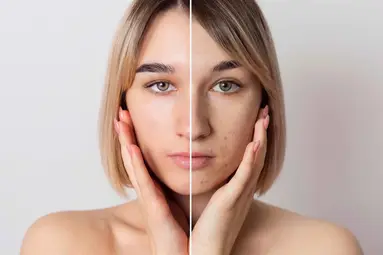CoQ10 for Skin: Benefits & Ways to Use It

CoQ10 for Skin: Benefits & Ways to Use It
Posted on 6th May, 2023
CoQ10, also known as ubiquinone, is a naturally occurring enzyme found in every cell in the human body. It plays an important role in the production of energy in the mitochondria, which are the powerhouses of the cells. CoQ10 is also a powerful antioxidant that helps protect cells from oxidative damage caused by free radicals.
In addition to its role in energy production and antioxidant activity, CoQ10 has been shown to have numerous health benefits, including reducing inflammation, improving cardiovascular health, and boosting immune function. CoQ10 levels in the body can be affected by age, certain medications, and medical conditions, such as heart disease and diabetes.
While the body naturally produces CoQ10, it can also be obtained through dietary sources such as fatty fish, organ meats, and whole grains. CoQ10 supplements are also widely available and can be taken orally to help support overall health and wellness.
In this article, we will delve into the benefits of CoQ10 for skin:
- Reduces Wrinkles: CoQ10 helps reduce the appearance of fine lines and wrinkles by promoting collagen production and neutralizing free radicals that cause skin damage.
- Improves Skin Hydration: CoQ10 helps improve skin hydration by enhancing the production of elastin and collagen, which are essential for maintaining skin elasticity and firmness.
- Enhances Skin Repair: CoQ10 helps support the natural repair and regeneration of skin cells by neutralizing free radicals that can cause damage and slow down the healing process.
- Protects Against Sun Damage: CoQ10 has been shown to protect the skin against sun damage by reducing inflammation and neutralizing free radicals that are generated by UV exposure.
Application
- Topical Application: CoQ10 is often added to skincare products, such as creams, serums, and lotions, for topical application. Look for products that contain at least 1% CoQ10 for optimal benefits.
- Oral Supplements: CoQ10 supplements can also be taken orally to help support overall skin health. Consult with a healthcare professional before starting any supplement regimen.
Other Benefits
In addition to its role in energy production and antioxidant activity, CoQ10 has been shown to have several other health benefits, including:
- Improving heart health: CoQ10 has been shown to improve heart health by reducing inflammation, lowering blood pressure, and improving the function of blood vessels.
- Supporting brain health: CoQ10 may have neuroprotective effects, helping to protect the brain from oxidative damage and reduce the risk of age-related cognitive decline.
- Reducing muscle damage: CoQ10 has been shown to reduce muscle damage and promote muscle recovery in athletes and people with muscle-related conditions.
- Supporting fertility: CoQ10 may help improve fertility in both men and women by improving sperm quality and egg health.
- Managing migraines: CoQ10 may help reduce the frequency and severity of migraines by improving mitochondrial function and reducing inflammation.
- Supporting healthy skin: CoQ10 has been shown to have several benefits for the skin, including reducing wrinkles, improving hydration, and protecting against sun damage.
While more research is needed to fully understand the potential health benefits of CoQ10, the evidence suggests that it may play a valuable role in promoting overall health and wellness.
Side Effects and Warnings
CoQ10 supplements are generally safe and well-tolerated, but there are some potential side effects and warnings to be aware of. These include:
- Digestive issues: CoQ10 supplements may cause mild digestive issues, such as nausea, diarrhea, and stomach upset.
- Headaches: Some people may experience headaches or dizziness when taking CoQ10 supplements.
- Allergic reactions: In rare cases, CoQ10 supplements may cause an allergic reaction, which can cause symptoms such as rash, itching, and difficulty breathing.
- Interactions with medications: CoQ10 supplements may interact with certain medications, including blood-thinning medications, chemotherapy drugs, and some antidepressants. If you are taking any medications, it's important to talk to your doctor before taking CoQ10 supplements.
- Pregnancy and breastfeeding: There is not enough research to determine the safety of CoQ10 supplements during pregnancy or breastfeeding, so it's best to avoid them during these times.
Conclusion
In conclusion, CoQ10 is a powerful antioxidant with numerous benefits for the skin, including reducing wrinkles, improving hydration, enhancing repair, and protecting against sun damage. Topical application or oral supplements can both be effective ways to incorporate CoQ10 into your skincare routine. As with any new skincare product, it is important to patch test first and consult with a healthcare professional if you have any concerns.
Overall, CoQ10 supplements are considered safe for most people when taken at recommended dosages. However, if you experience any adverse effects or have concerns about taking CoQ10 supplements, it's important to talk to your doctor.

Health articles from our experts

Guide To Eating for Anti-Aging Benefits and Youthful Skin

Guide To Eating for Acne-Free Skin

Revitalize your Dull Skin with Amla and ABC Juice

A Comprehensive Guide On How To Reduce Pigmentation

A Comprehensive Guide To Prevent Acne

Skincare Tips for Different Seasons - Adapting Your Routine to Weather Changes

CoQ10 for Skin: Benefits & Ways to Use It

5 Best Benefits Of Ashwagandha For Skin

10 Foods Rich In Glutathione

